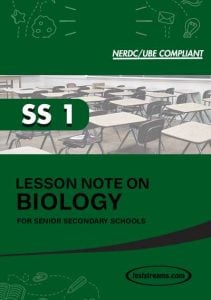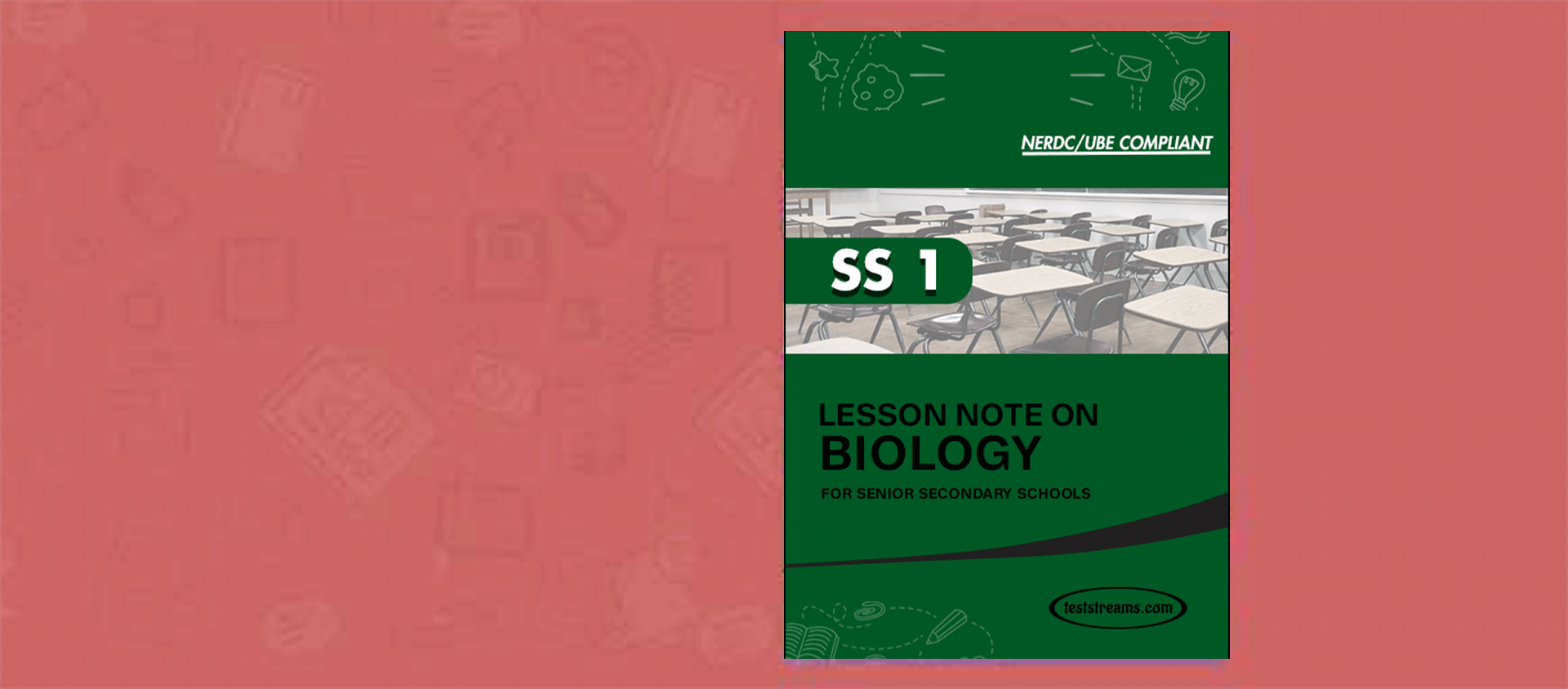This BIOLOGY Lesson Note was pulled from our book (Lesson Note on BIOLOGY for SS1 MS-WORD); Compiled to serve as reference material to help teachers draw out their lesson plan easier, saving you valuable time to focus on the core job of teaching.
This Biology Lesson Note CoversThe Following Topics
- BIOLOGY AND LIVING THINGS
- LIVING THING AND NON-LIVING THING
- CLASSIFICATION OF LIVING THINGS
- ORGANIZATION OF LIFE
- PLANT NUTRITION
- NUTRIENT CYCLING IN NATURE
- NUTRITION IN ANIMALS
- MODES OF NUTRITION
- BASIC ECOLOGICAL CONCEPT
- GROWTH
- BASIC ECOLOGICAL CONCEPT
- ECOLOGICAL MANAGEMENT
- TOLERANCE
- ADAPTATION
- POLLUTION
- CONSERVATION OF NATURAL RESOURCES
- REPRODUCTION
- MICRO-ORGANISMS AROUND US
- CONCEPT OF CULTURING
- MICRO-ORGANISMS IN ACTION
- SEXUALLY TRANSMITTED INFECTIONS (STIS)
- TOWARDS BETTER HEALTH
- POPULATION STUDIES
- FUNCTIONING ECOSYSTEM
- ENERGY TRANSFORMATION IN NATURE
Sample note
Week 1
Topic: Biology and Living Things
Biology As An Inquiry In Science
Science is defined as a systematic process of making enquiry about the living and non-living things in our environment. It is the study of natural things around us and biology as a branch of science is derived from the Greek word bios, “life” and the suffix –logia, “study of.” Biology is a natural science concerned with the study of life and living organisms, including their structure, function, growth, evolution, distribution, and taxonomy. Biology generally recognizes the cell as the basic unit of life, genes as the basic unit of heredity, and evolution as the engine that propels the synthesis and creation of new species. It is also understood today that all organisms survive by consuming and transforming energy and by regulating their internal environment to maintain a stable and vital condition.
Meaning Of Science
Science can be defined as the systematic process of making enquiries about living things and non-living things in our environment.
Definition Of Biology
Biology is coined from two Greek words; ‘Bio’ meaning life and ‘Logos’ meaning study. Biology can simply be defined as the study of life or the study of plants and animals. It is also the scientific study of life or living matter in all its forms and processes.
Branches of Biology.
Biology is basically grouped into two main branches. These are:-
Zoology – The study of animals
Botany – The study of plants
Other branches include
Ecology – The study of plants and animals in relation to their environment.
Morphology – This involves the study of external features of plants and animals
Anatomy – This is the branch of biology which involves the study of the internal structures of plants and animals
Genetics – This is the scientific study of heredity and variation in living things
Physiology – This involves the study of how plants and animals function.
Scientific Approach
It involves sequences of making inquiries about an object or things understudy in science. Scientific methods of science include;
| Observation | Hypothesis | Classification | Experiment |
| Inferences | Measurement | Conclusion | Theory or Law |
The starting point of scientific methods is Observation which involves the use of senses to describe what one has seen or felt about an object. The observation leads to classification, then to interference and later to measurement and identification of the existing problems.
Usefulness of Science
- Medicine – Science has contributed greatly to the manufacture of vaccines and drugs that are used to cure various diseases of man
- Manufacturing Industries – Various materials are combined together to manufacture many finished products
- Construction – Roads, railways, airports have been designed and constructed as a result of the knowledge of science
- Engineering – Ship building, skyscrapers, bridges, roads have been designed and constructed due to the knowledge of science
- Technology – Science has helped in the development of computers, telephones, telex, fax machines have been developed with the aid of science which now makes communication easier.
- Transportation – Aerolanes, ships, rockets have been built due to the knowledge of science
Practice Questions
1 ……….. is the study of plants and animals in relation to their environment.
a) Entology
b) Ecology
c) Autology
d) Ecosystem
2 ……….. is the branch of biology which involves the study of the internal structures of plants and animals.
a) Morphology
b) Entymology
c) Anatomy
d) Physiology
3 Which of this is not a usefulness of science?
a) Transportation
b) Communication
c) Medicine
d) Market
4 ……….. is defined as a systematic process of making enquiry about the living and non-living things in our environment.
a) Scientific
b) Sciences
c) Science
d) Biology
5 The starting point of scientific methods is …………….
a) Classification
b) Observation
c) Observer
d) Identification
6 …………. is not a branch of Biology.
a) Autelogy
b) Zoology
c) Ecology
d) Genetics
7 …………… involves the study of external features of plants and animals.
a) Autelogy
b) Zoology
c) Ecology
d) Morphology
8 ……………. refers to the study of plants.
a) Autelogy
b) Botany
c) Ecology
d) Genetics
Answers
- B
- C
- D
- C
- B
- A
- D
- B

Get the complete Lesson Note with more content at very affordable price. Lesson Note on BIOLOGY for SS1 MS-WORD- PDF
![]()




